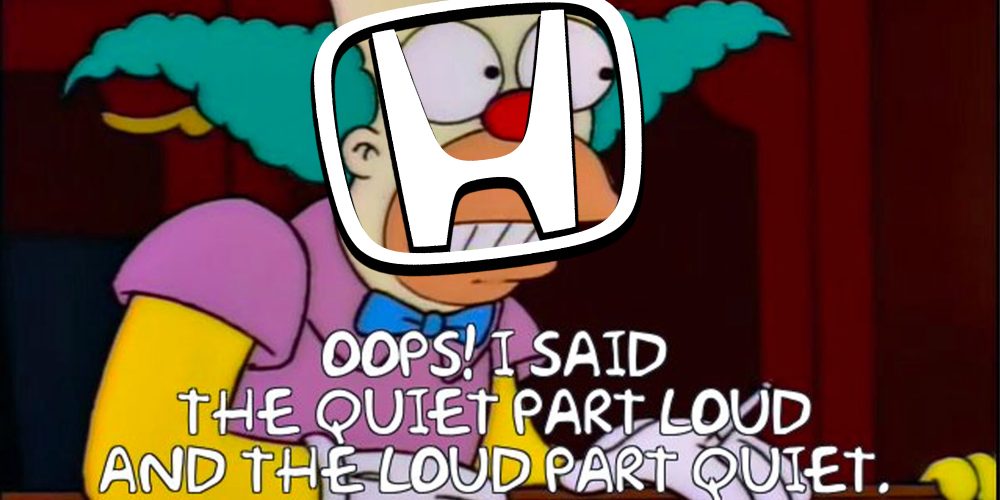Honda CEO Toshihiro Mibe recently spoke to proposals of hydrogen combustion cars by rivals like Toyota, stating his company studied the technology’s potential ten years ago. Mibe went on to say that unlike Toyota, Honda doesn’t see hydrogen combustion as feasible for cars. That doesn’t mean the Japanese automaker is abandoning the chemical element, however. Hydrogen Fuel Cell EVs remain a key part of its zero-emissions strategy looking forward.
Both Honda and Toyota sit as major names in Japanese autos, globally recognized for their gasoline models. Camry, Accord, CR-V, RAV-4 – the list goes on. However, as the rest of the automotive world seems to have finally embraced battery electric vehicles, these two automakers have focused their efforts elsewhere.
Toyota especially, believes its hybrid models will stay competitive over the next 30 years alongside its hydrogen fuel cell EVs like the ill-fated Mirai, which has sold less than 10,000 total units in North America since it debuted in 2015. Honda has taken a crack at FCEVs too with its Clarity Fuel Cell.
Part of the reason for this investment is backing from the Japanese government, which has bet big on hydrogen to reach carbon neutrality by 2050. While hydrogen technologies could very well prove to be the best fuel option for larger transportation around the world, BEVs appear to be the clear winner for consumer vehicles.
As a result, these two Japanese automakers have come around a bit on EVs, each announcing their own electrified lineups, but not without caveats. Honda is still questioning consumer uptake, particularly in the US, while Toyota continues to work behind the scenes to slow EV adoption, and has even used propaganda in Japan to sway school children toward a future filled with hybrids.
Honda has spoken out against the possibility of hydrogen Combustion or, the actual burning of hydrogen, to power vehicles, separating itself from its competitor Toyota.

Honda breaks from Toyota stating hydrogen combustion isn’t feasible
Honda CEO Toshihiro Mibe’s words were reported by Automotive News along with the following statement from late 2021:
We have conducted research into every possibility that’s out there. As for hydrogen engines, we see some quite difficult technological challenges. So, about 10 years ago, we decided this would not become mainstream.
Meanwhile, Toyota continues to promote hydrogen cars while also expanding BEVs… all while still aggressively pushing gasoline hybrids. Despite Mibe’s words, Honda is by no means abandoning hydrogen fuel cell technology. The company sees atomic number 1 as a viable fuel source for larger, long-range vehicles, or in cells as standalone power packs.
Furthermore, Mibe has shared continued plans for FCEVs. Here’s an excerpt from an announcement last April:
Honda today announced key targets for sales of electrified vehicles in North America, with a plan to make battery-electric and fuel cell electric vehicles to represent 100% of its vehicle sales by 2040, progressing from sales of 40% by 2030 and 80% by 2035.
Honda Motor also has a jet aircraft subsidiary that Mibe points out cannot fly on batteries, but green fuels like hydrogen could offer a clean solution in the future.
To what extent hydrogen is involved in that future remains unclear, given that Honda is still exploring the technology with companies like GM. Based on its CEO’s words however, battery-powered Honda cars seem much more likely. Mibe spoke one last time:
If we look at what will become mainstream, probably for smaller mobility it will be EVs, and fuel cells for larger mobility. That is the conclusion so far.
Electrek’s take
It’s refreshing to see an admission like this from Honda’s new CEO, even if it is a tad late. I think Mibe makes a very strong point in the potential of hydrogen as well.
When you look fifty years down the road, hydrogen makes a lot of sense for most transportation. Currently, hydrogen fuel cells feel like a genuine possibility for long distance, zero-emission flights too.
I don’t think either of these companies should give up on hydrogen technologies. However, it’s important to recognize where it can and cannot work, and consumer vehicles are not the answer. We will have a hard enough time building out electrical infrastructure for BEV charging. Where are we going to store all that required hydrogen and how are we going to safely transport it to every charging station?
Truck depots, train yards, and airports make a lot more sense, and I hope these companies and others continue to research its possibilities . The more zero-emission options the better, we all win in that sense. Please focus more time and energy into BEVs however, because that technology makes a lot more sense for people traveling in their day to day commutes.
FTC: We use income earning auto affiliate links. More.

Comments